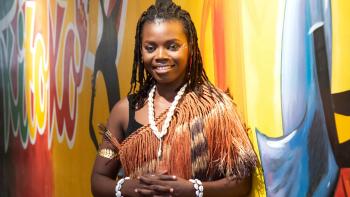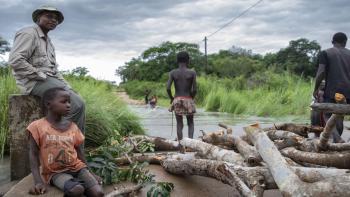Why do you believe that it is essential to get young people involved in development policies?
To meet today's development challenges in all their diversity and globality, whilst taking a long-term approach, we have no choice but to implement policies that take account of young people. In fact young people are at the center of all the most urgent issues facing us, such as climate change, education and employability.
Not only must young people be the priority target of development policies, they must also be among the most active stakeholders. This is the meaning of a modern development policy: to give young people, in France and in our partner countries, levers with which to act.
Do they have a better grasp of what is at stake?
What is certain is that today's young people are faced with new constraints and threats that did not exist a few years or decades ago. It is therefore our role to stimulate their ability to get actively involved in public life and to remove the obstacles and barriers that prevent them from doing so, wherever possible. In addition, this is in line with many recent movements – the climate demonstrations in Europe for example – which have shown that young people no longer want to remain on the sidelines in society.
More globally, development policy needs to get as many people on board as possible. NGOs are already mobilized, companies are beginning to be as well, foundations are becoming increasingly essential players, and now it's also up to our young people to get to grips with this policy area.
The idea is really to decompartmentalise the initiatives, to develop an approach based on co-construction! France's overseas development policy can no longer remain the exclusive preserve of the Ministry of Foreign Affairs and a few parliamentary committees.
What levers for action are available?
Surprisingly, the composition of the French advisory bodies in the overseas development field leaves very little room for young people. That's why I am proposing to set up a youth college within the National Council for Development and International Solidarity (CNDSI). The aim is to give them the opportunity to express their views, so that they can say how they see the future (since they are the first to be concerned) and so that they can take part in the debate on the issues involved in overseas development, contributing directly to reflection and, of course, to action.
This is also about getting young French people from all sorts of backgrounds involved in this process. Beyond Paris and the big cities, there is still a large portion of our young people who unfortunately do not yet have the possibility of getting involved in the field of international solidarity.
So precisely how can we reach all these young French people?
We must take a three-pronged approach: inform, understand and act. Inform to get young people to understand that we share our destiny with the entire planet. In school we learn about first aid and citizenship… Learning about and understanding this world we all have in common, the solidarity that is necessary between countries seems to me to be just as essential. Above all, there is demand for it: when we create spaces for discussion, when we talk about solidarity and international issues, our citizens are genuinely interested. Understanding and interpreting the world, giving meaning to globalization, these are issues that mobilize people.
Then you have to give them the means to take concrete action. We are thinking about including a scheme in the last phase of Universal National Service that allows all young people who so wish to volunteer overseas (for example with an NGO), by broadening access to the volunteering schemes that already exist.
Finally, in the field of higher education, in my report I propose the creation of a "young international experts" programme along the lines of the British ODI Fellowship Scheme, which gives young graduates the possibility of working in a public institution in a partner country. This facilitates the transfer of skills to these countries whilst giving the young person an international experience that is highly valued on the job market. These are measures that will give young people the keys to understanding at the same time as a means of doing something concrete: these are the two legs we need to walk on.
You also insist on the need for better inclusion of the young people of partner countries, in particular in Africa…
Quite right, that seems to me to be essential. The relationship we need to build with our partners is not only technical and financial, it is also political. The discussions we have with them cannot be reduced to the building of roads, infrastructure, projects.
We need to talk to young Africans in the same way as we talk to young Americans, to young Japanese… So that they no longer have the impression that France and the other European countries only see their relationship with Africa through the lens of issues like security and development.
This absolutely does not mean that there is any intention of interference or interventionism on our part. The idea is to work towards relations based on partnership, shared responsibility, transparency and the comprehensive inclusion of all aspects of the subjects covered. Striking up a political dialogue with every segment of society... that's where the real key to a relationship between equals and a real partnership is to be found.
More generally, how can we make development policies and programmes more effective?
The sector-wide approach has its limits. To prioritize a policy that targets populations more, we need to focus on young people, women and rural communities. This paradigm shift must enable us to build more cross-cutting, more comprehensive policies, which take better account of the diversity of territories and spheres of action.
To achieve this, we have to ensure that we have the means to support more small-scale projects. I think we were mistaken in believing that the overseas aid relationship necessarily meant funding large projects… We have already increased the amounts granted to the embassy innovative project support fund, which has gone up from €24m to €32m this year, focusing on three priorities: young people, climate change and young female entrepreneurs. AFD is also trying to support more small projects linked to these pillars with initiatives like Digital Africa and Choose Africa.
Your report also insists on the need to better integrate diaspora populations in the construction of these policies…
How is it possible to envisage a relevant partnership policy that reaches the right targets, if we fail to involve in the development and implementation of our policies all those who have a special relationship with the countries their families came from? Until now, we have contented ourselves with involving the diasporas only in the financial and economic considerations.
In fact there is an entire, hyper-dynamic ecosystem that we are only just beginning to rely on, in particular thanks to AFD's diaspora task force. In our companies and our public bodies we must find a way to integrate this partnership-focused dynamic more and to facilitate smoother movements in both directions.













